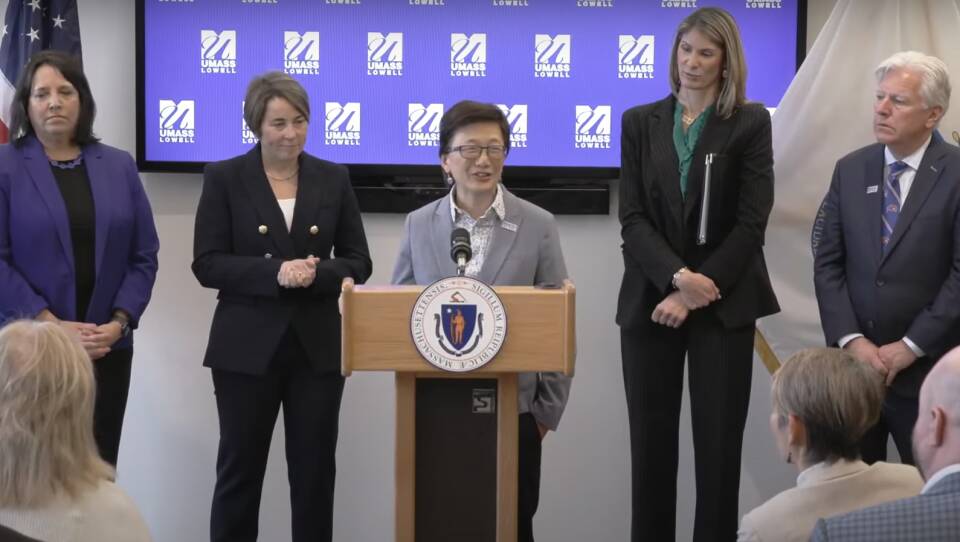A new economic development project is set to bring a few thousand jobs, 500 units of housing and millions of dollars in new tax revenue to the city of Lowell. Officials hope it will also be a way to encourage recent college grads and other young people to stay in the region.
In all, U.S. Rep. Lori Trahan said, the combined effort of UMass Lowell, officials across all levels of government and the private sector has positioned the Mill City "for a multibillion-dollar economic and jobs boom, the likes of which hasn't happened here since the Industrial Revolution two centuries ago."
Trahan and Gov. Maura Healey visited UMass Lowell to announce what they described as a key milestone in the public-private partnership. The Cambridge-based research nonprofit Draper Laboratory will expand to become the anchor tenant at the project, known as the Lowell Innovation Network Corridor, or LINC. The project will add research and office space, as Draper looks to double its staff of 2,400, along with more storefronts for retail and restaurant opportunities.
Healey said the project will generate $3.7 billion in economic activity and ultimately create 2,000 permanent jobs, as well as 1,300 construction jobs as it takes shape.
"If there's one thing I want to lift up in this, it's that housing is incorporated into this," she said. "I don't want to see kids in their 20s or students or grad students or young entrepreneurs or founders go elsewhere simply because they can't afford to live here."
UMass Lowell started acquiring properties for the project as far back as 2010, when Marty Meehan, now president of the University of Massachusetts system, led the Lowell campus.
Meehan said that was part of a long-term strategy to create space for companies that wanted to locate near the university. He said the approximately 500 housing units that will be created through the project "will be smaller-type housing designed for young professionals who are just graduating from college."
"We think we can keep a lot of our students here, in Massachusetts and in the Merrimack Valley, by developing housing that students want to stay in," Meehan told GBH News. "At the same time, those students are also going to — when they graduate — have the opportunity to get permanent jobs at a place like Draper."
Private developers GMH Communities and Wexford are partnering with the university on the project. UMass Lowell Chancellor Julie Chen said the developers "have been willing to invest over $600 million in this project."
Chen said in an interview that the state is stepping in and "filling the last piece of the pie," and there has been "a lot of good, detailed conversation" about what the state's investment will be. She said the public-private partnership means the university will not need to raise tuition or other student costs to finance the project.
Chen said the LINC project "is a much bigger vision for transforming the university and the city" by drawing companies to Lowell.
"By starting to create that momentum, we're going to generate clusters of companies in different fields that are going to be up here in Lowell," Chen said. "They're going to offer great jobs, everything from high school graduate to CEO. These are the types of things that we envision, and that just has a multiplier effect. Once you have those people with great jobs, the city's providing a wide range of housing options, and then that's just going to help restaurants and retail and nonprofits and arts and entertainment."








